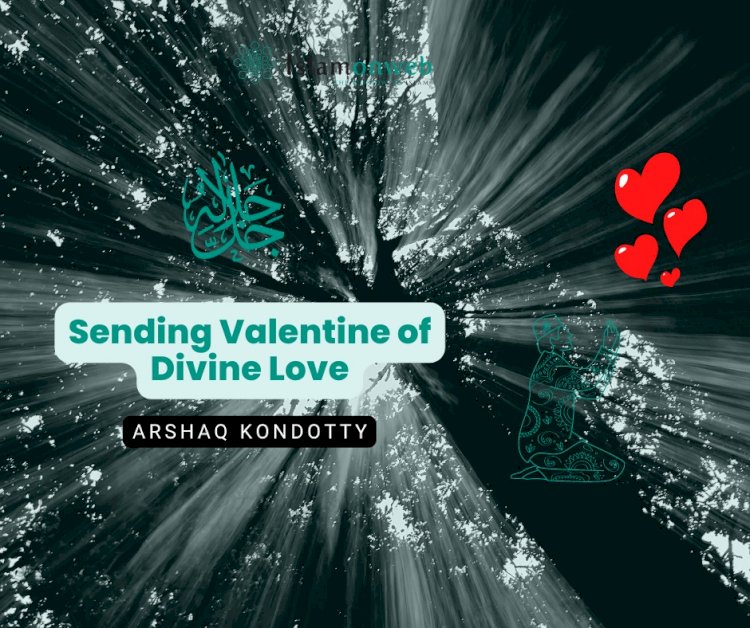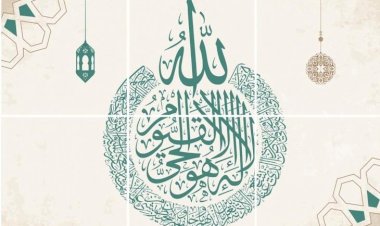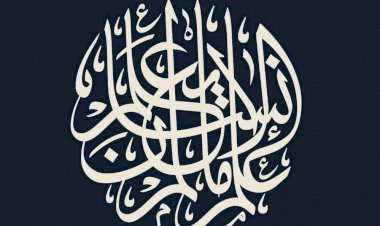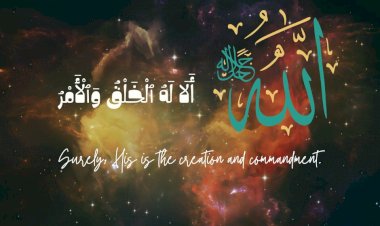Sending Valentine of Divine Love
The virtue of love is universally recognized. In Islam, the concept of love has great importance. This fact manifests not only in mysticism but also in Islamic philosophy, theology and ethics. Indeed in some aspects, it plays a crucial role. For instance, in defining the relationship between God and mankind, love is the most significant concept.
Since humans are supposed to love both the Creator and creation, there is a great mistake in conceiving the distinction between them. According to the prophetic saying: “no one is a true believer until he loves God and his Prophet (ﷺ) more than anything else.” Love of God should always be top of the list.
‘Express your love by sharing valentines among those whom you love’. That is what advertisers want you to think in February. While it’s quiet and comfortable to do things often, Valentine’s Day comes once a year, leaving no choice but to purchase the valentines. For owners of floral boutiques and chocolate shops, the festival comes in February. Don’t you think love is commercialized here?
‘You should dive into the pool of love’, it’s the most common stereotyping message given to young minds by advertisements and Media. No film industry taught anyone to love the Creator more than the creations. The Quran says:
قُلْ إِن كَانَ آبَاؤُكُمْ وَأَبْنَاؤُكُمْ وَإِخْوَانُكُمْ وَأَزْوَاجُكُمْ وَعَشِيرَتُكُمْ وَأَمْوَالٌ اقْتَرَفْتُمُوهَا وَتِجَارَةٌ تَخْشَوْنَ كَسَادَهَا وَمَسَاكِنُ تَرْضَوْنَهَا أَحَبَّ إِلَيْكُم مِّنَ اللَّهِ وَرَسُولِهِ وَجِهَادٍ فِي سَبِيلِهِ فَتَرَبَّصُوا حَتَّىٰ يَأْتِيَ اللَّهُ بِأَمْرِهِ ۗ وَاللَّهُ لَا يَهْدِي الْقَوْمَ الْفَاسِقِينَ
{Say: If your fathers, your sons, your brothers, your wives, your kindred, the wealth that you have gained, the commerce in which you fear a decline, and the dwellings in which you delight are dearer to you than Allah and His Messenger, and striving hard and fighting in His Cause, then wait until Allah brings about His Decision (torment). And Allah guides not the people who are disobedient to Allah} (al-Tawbah: 24).
It should be considered that all things listed in this verse are ‘Halal’ to be in love with. Yet Allah strictly warns us not to get exaggerated in the love of his creations more than Allah, his Messenger (ﷺ) and exertion in good cause. Can we really claim that our love for Allah is greater than our love for dears and nears, money, status or even spouses and children?
Love is a divine driver that Allah fixed in the core of human beings to bring them back to their roots. Taking the place of Allah, Majnoon loved Laila and it almost killed him. Whereas for Qaroon (korah), it was the love of wealth and for Fira’un (pharaoh), it was the love of position and power. On the other hand, there are prophets and Sufis who all lived and died for the love of Allah. Vast is the distance that separates them in their love.
That’s not to say that there is no place for ‘love’ in Islam rather than the love of God. The Quran clarifies: {He created for you from yourselves mates that you may find tranquility in them and he placed between you affection and mercy} (al-Rūm: 21).
In opposite of what Plato defined love as ‘a serious mental disease’, Islam introduces love as a carrier of calm and tranquility. True love brings about serenity and allows us to be at peace with ourselves and God. That is why Allah says: “That you may dwell in tranquility”.
Love could be a serious mental disease if the love of creation is put in the central part of the heart. Hearts contain different compartments each one created for a specific kind of loves. The most central part is for the love of God but humans commonly use it for love of creations. That is why love which is meant to be peace and calm, is leading to crimes and offences.
Every day in India, eight people are killed, and 21 are lost to suicide over disputes over love. According to media reports, love has actually led to more deaths in the country than ever, and it is six times more than terrorist attacks. Analysis of NCRB data reveals that: romantic relationships, including extramarital ones, account for more than ten per cent of all murders in the country.
To clarify the distinction between the love for the Creator and creations, let’s consider an analogy. Suppose, instead of filling your car’s gas tank with petrol, you poured the water into it which was meant to wash the ear. What will happen? Not only you can’t ride the car, but you will also damage the car itself. Likewise, if the love of creations which is meant to be just a part of your heart is put at the centre of it, you will ruin your life entirely.
Allah says in the Quran:
وَمِنَ النَّاسِ مَنۡ يَّتَّخِذُ مِنۡ دُوۡنِ اللّٰهِ اَنۡدَادًا يُّحِبُّوۡنَهُمۡ كَحُبِّ اللّٰهِ وَالَّذِيۡنَ اٰمَنُوۡٓا اَشَدُّ حُبًّا لِّلّٰهِ
{Yet there are some who set up equals with God and love them as they should love God, but those who believe, love God most}(al-Baqarah: 165).
Human-made gods and idols are not only what humans set up as equal to Allah. Since whatever humans love most in life is their master, everything they put at the centre of their heart can be considered something they set up as equal to God. Can we really claim that our love for God is at the central part of our heart rather than the love for money, status or success?
When Allah blesses us with someone whom we love, we forget that Allah is the source of that blessing and we begin to love that person as we should love Allah. That person becomes at the centre of our hearts. So now, we have shifted our worship from the source of the blessing to the blessing itself. That is really a dangerous point because the Prophet (s) said: “You’re (in hereafter) with the one whom you love.”
A true believer should love the creations not in place of God but for the sake of God. We read in a famous hadith that the Prophet (s) asked his companions for “the firmest hand-hold of faith”. They suggested different things like prayer and Hajj. When they could not give the appropriate answer, the Prophet (s) said: “the firmest handhold of faith is to love for the sake of God and to hate for the sake of God, to befriend God’s friends and renounce His enemies.”
Nowadays, if the youngsters of our society had fallen in love for the sake of Allah, there wouldn’t have been suicides of losing one’s partner. A break up can lead people to do suicide, as we see in news on frequent form. If a girlfriend is our reason for being, something is terribly wrong. The Quran says:
فَمَن يَكۡفُرۡ بِٱلطَّـٰغُوتِ وَيُؤۡمِنۢ بِٱللَّهِ فَقَدِ ٱسۡتَمۡسَكَ بِٱلۡعُرۡوَةِ ٱلۡوُثۡقَىٰ لَا ٱنفِصَامَ لَهَاۗ
{So, whoever rejects false gods and believes in God has grasped the firmest hand-hold, one that will never break} (AL-Baqarah: 256).
Humans become slaves to whatever they love most. Henceforth, if the love for creations is more beloved to them than God, they are not holding the firmest handhold and whoever loves God most is in safe hands.
Love is the very essence of faith. Remember the words of Rumi: “love is the water of life.” When that love is a divine one, the water would be the purest, or if that is a bare love for creations, the water could be poisonous which can destroy life.
In a nutshell, love is a divine design created for humankind to guide themselves to the right path of God, in ordinance to worship him. After all, that is why humans are sent to this world. But along the way, they are getting lost and begin to love creations as they should love God. This doesn’t mean that humans shouldn’t love creations, but the love for creations should be only for the sake of Allah. As Rumi puts it, loving creation is just a path to the love of God. We are all running. But few of us are running in the right direction. We have the same goal but to get there we need to stop and examine who is at the centre of our hearts.
References
Reclaim your heart, FB Publishing 2015, Yasmin Mogahed
Holy Quran, Surah 2, al Baqarah verse 165
Holy Quran, Surah 2, al Baqarah verse 283
Holy Quran, Surah 9, at Tawbah verse 24
Tafsir Quran al Aleem- Ibn Kathir
Towards understanding Quran- website
About author: Muhammad Arshaq S/o Kunhimoideen Faizy. Degree research scholar, Darul Uloom Islamic Da’wa College, Thootha (affiliated to Darul Huda Islamic University, Chemmad). Also pursuing a degree in psychology at the Indira Gandhi National Open University. Keen interest in Islamic psychology and study of human behavior, with an ambition to write books on Islamic psychology.
Disclaimer
The views expressed in this article are the author’s own and do not necessarily mirror Islamonweb’s editorial stance.

























Leave A Comment